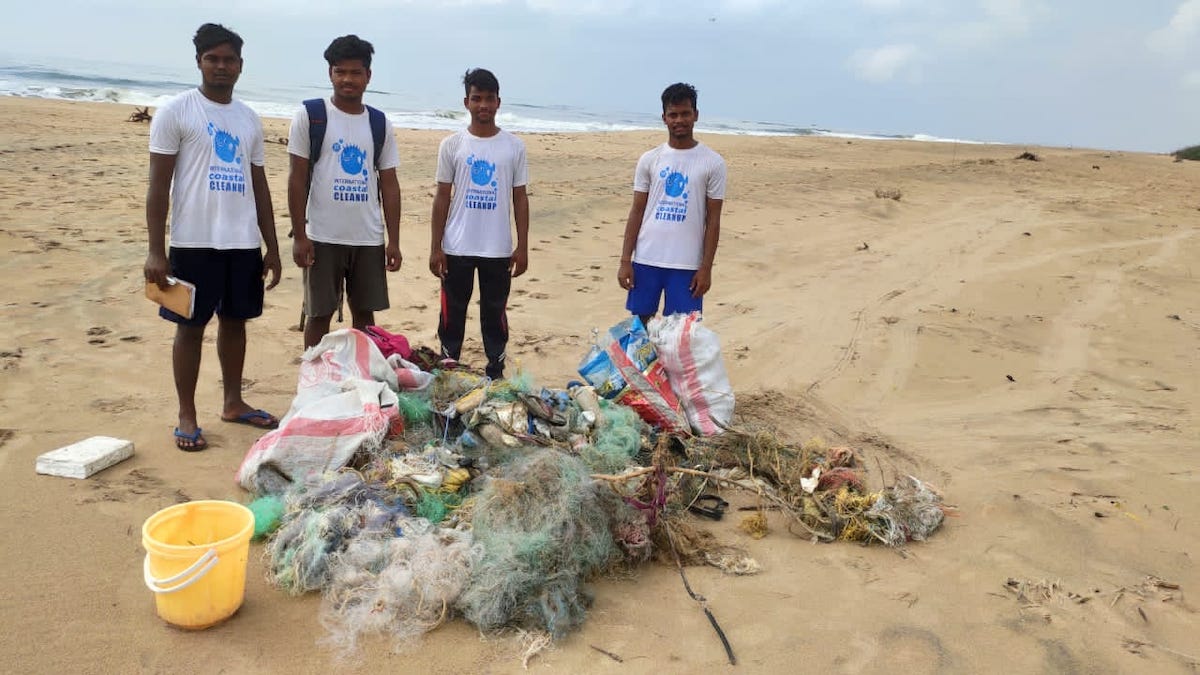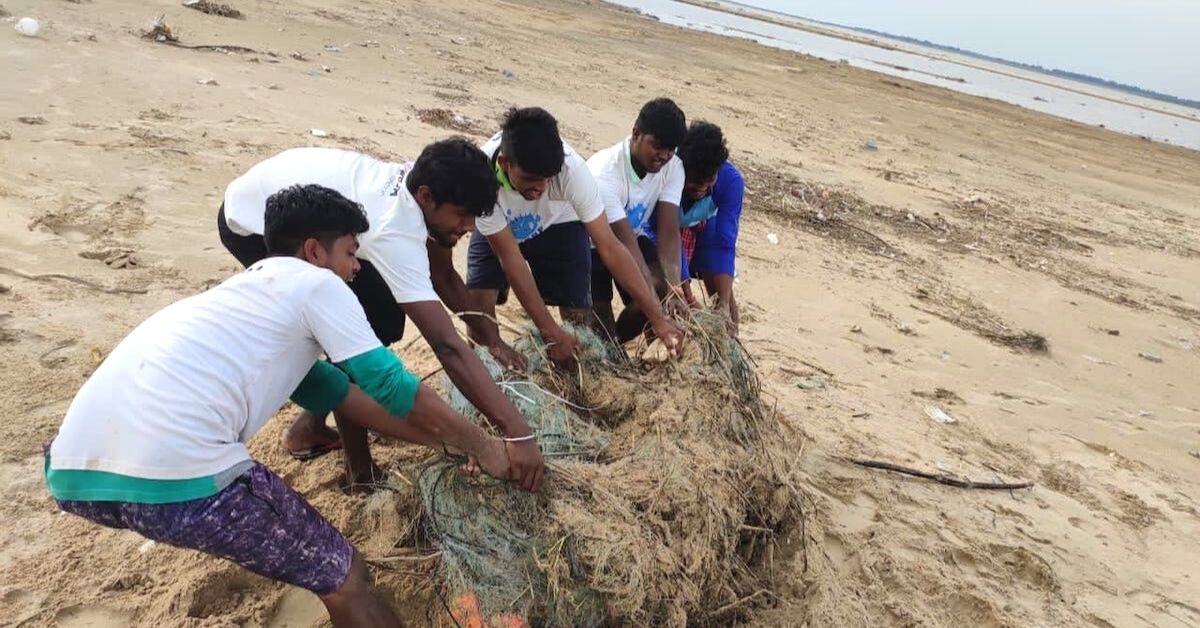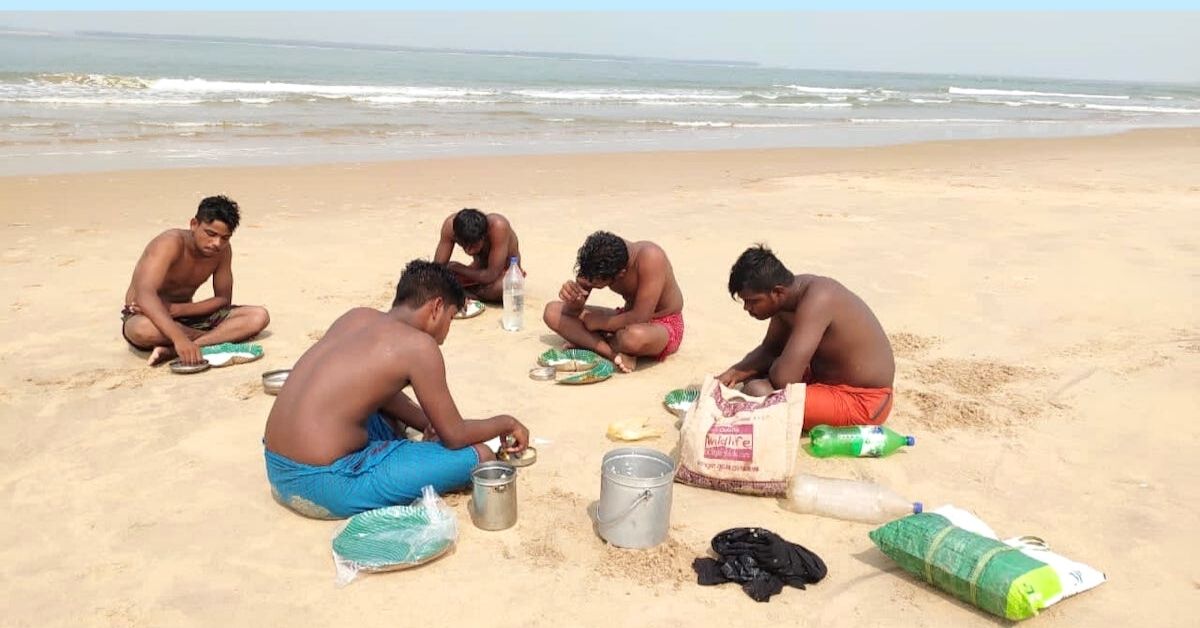Walking For 6 Hours a Day, Odisha Group Clear 5 Tons of Beach Waste With Bare Hands
Starting a month-long drive on September 27, the youngsters collected waste reaching Indian shores from countries like Sri Lanka, South Korea, Malaysia, Indonesia

After a gap of one month, when meeting friends and relatives, Soumya Biswal and his five friends in Odisha faced a common question – “Why do you look tired, tanned and slimmer than usual?” Most could not comprehend how this group of friends could have undergone such physical changes in such a short duration of time. There was only one answer – They were all busy cleaning the 24 km Astaranga beach in Puri, Odisha, collecting five tonnes of waste.
Since 2014, Soumya, along with his friends and cousins, have volunteered to clean beaches, raise awareness about the conservation of Olive Ridley turtles, change the mindset of people and conduct workshops on the hatching and protection of turtles.
“The beach is located near the Devi river where the water meets the sea. Apart from having a pristine view for travellers, the beach is one of the important nesting sites for Olive Ridley turtles,” says Soumya.
The Devi River convergence is one of three crucial locations in Puri, (Rushikulya and Gahiramatha are the others) where the nesting of these turtles take place.
Need for a safer habitat for Olive Ridley turtles

“The government acknowledges the importance of conservation of these sites, but little gets done on the ground. Moreover, the other beaches get more attention as they have more tourist value. The Astaranga beach gets sidelined in the process,” Soumya says.
Since 1999 the Astaranga beach has not witnessed any massive nesting of turtles. Nestings of only a few hundred have been reported on a single night, compared to thousands that are expected for the same duration.
The 23-year-old says cyclone Amphan and Covid-19 lockdown further deteriorated the condition of the beach.
“We wanted to make the habitat safer for turtles. At a distance, the beach looks clean. But its white sand camouflages the huge amounts of waste,” Soumya says.
On September 27, the six youngsters – Soumya, Dilip, Prabhakar, Santosh, Susant and Suman decided to take up the dirty work themselves and started picking up the waste.
Soumya says the friends would start during the early hours of the morning and continued till late hours.
“We woke up at 4 am to clean the beach carrying 20 litres of water and some food for the day. We did not return home for meals or breaks,” Soumya says.
Walking long miles

But the task that initially seemed feasible turned out to be much more difficult than perceived. Dilip Biswal says, “The first ten days went well as we covered a beach around 7 km long from our homes. But the effort began to increase as we had to walk for more distances to clean the stretch and again return the same distance.”
Dilip says the group spent about 10-12 hours each day, of which four hours passed in walking long distances and carrying all the daily ration. The group then went cleaning for a kilometre or two, and then walked back home.
“We had no scope for shade, and the afternoon heat took much toll on the work. We ran out of the water and also went hungry for a few days,” he adds.
The youngster said that on occasion they witnessed rains and high tides that brought more waste to the shore.
“We also got caught in the high tide between the mouth of the river during the high tide, forcing us to stay put for hours with waste bags on our heads waiting for the seawater to recede,” Dilip adds. Dilip says the waste could not keep lying at the beach as it would eventually scatter or make its way back to the sea.
At the end of the exercise, the group claims to have found waste like plastic bottles and containers from Sri Lanka, South Korea, Malaysia, Indonesia and other countries whose language they did not recognise.
More action than awareness
By the end of the third week, their efforts (posted on a Facebook page) was recognised by the district administration, and Mahindra & Mahindra provided them with a tractor to carry the waste.
“The collector asked to put the waste with a local company for managing it. But as we did not have vehicles, we walked six km to transport the waste bags until the tractor came,” Dilip says.
Dilip narrates that despite a month of effort cleaning a 24 km stretch and collecting 5,000 kgs of waste, much more needs to be done. “It is the first time we took a mission to clean a long stretch at one go apart from the occasional cleaning drives taken in other beaches,” he explains.
The youngster feels that regular cleaning needs to get done to maintain the condition. “We need a car or vehicles to carry rations and reach the cleaning spot soon. We spend half our time covering distances and could only clean the beach for 6-8 hours,” he adds.
“The exercise has told us that more efforts are needed in terms of action than raising awareness. About 90 per cent of action is needed, and 10 per cent of awareness. In six years of working environment conservation and knowing about Olive Ridley turtles, I have realised that humans cannot survive without environment,” Dilip says.
(Edited by Vinayak Hegde)
If you found our stories insightful, informative, or even just enjoyable, we invite you to consider making a voluntary payment to support the work we do at The Better India. Your contribution helps us continue producing quality content that educates, inspires, and drives positive change.
Choose one of the payment options below for your contribution-
By paying for the stories you value, you directly contribute to sustaining our efforts focused on making a difference in the world. Together, let’s ensure that impactful stories continue to be told and shared, enriching lives and communities alike.
Thank you for your support. Here are some frequently asked questions you might find helpful to know why you are contributing?


This story made me
-
97
-
121
-
89
-
167











